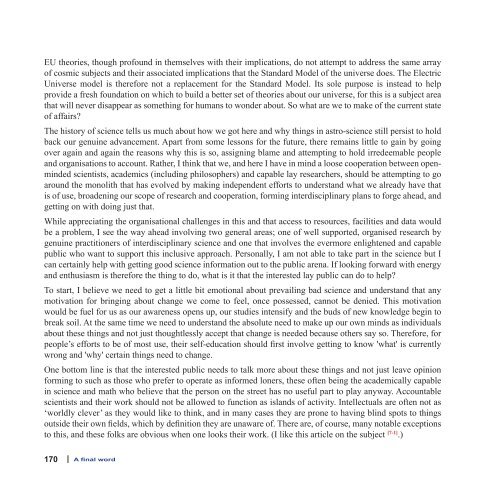A Beginner's View of Our Electric Universe - New
A Beginner's View of Our Electric Universe - New
A Beginner's View of Our Electric Universe - New
You also want an ePaper? Increase the reach of your titles
YUMPU automatically turns print PDFs into web optimized ePapers that Google loves.
EU theories, though pr<strong>of</strong>ound in themselves with their implications, do not attempt to address the same array<br />
<strong>of</strong> cosmic subjects and their associated implications that the Standard Model <strong>of</strong> the universe does. The <strong>Electric</strong><br />
<strong>Universe</strong> model is therefore not a replacement for the Standard Model. Its sole purpose is instead to help<br />
provide a fresh foundation on which to build a better set <strong>of</strong> theories about our universe, for this is a subject area<br />
that will never disappear as something for humans to wonder about. So what are we to make <strong>of</strong> the current state<br />
<strong>of</strong> affairs?<br />
The history <strong>of</strong> science tells us much about how we got here and why things in astro-science still persist to hold<br />
back our genuine advancement. Apart from some lessons for the future, there remains little to gain by going<br />
over again and again the reasons why this is so, assigning blame and attempting to hold irredeemable people<br />
and organisations to account. Rather, I think that we, and here I have in mind a loose cooperation between openminded<br />
scientists, academics (including philosophers) and capable lay researchers, should be attempting to go<br />
around the monolith that has evolved by making independent efforts to understand what we already have that<br />
is <strong>of</strong> use, broadening our scope <strong>of</strong> research and cooperation, forming interdisciplinary plans to forge ahead, and<br />
getting on with doing just that.<br />
While appreciating the organisational challenges in this and that access to resources, facilities and data would<br />
be a problem, I see the way ahead involving two general areas; one <strong>of</strong> well supported, organised research by<br />
genuine practitioners <strong>of</strong> interdisciplinary science and one that involves the evermore enlightened and capable<br />
public who want to support this inclusive approach. Personally, I am not able to take part in the science but I<br />
can certainly help with getting good science information out to the public arena. If looking forward with energy<br />
and enthusiasm is therefore the thing to do, what is it that the interested lay public can do to help?<br />
To start, I believe we need to get a little bit emotional about prevailing bad science and understand that any<br />
motivation for bringing about change we come to feel, once possessed, cannot be denied. This motivation<br />
would be fuel for us as our awareness opens up, our studies intensify and the buds <strong>of</strong> new knowledge begin to<br />
break soil. At the same time we need to understand the absolute need to make up our own minds as individuals<br />
about these things and not just thoughtlessly accept that change is needed because others say so. Therefore, for<br />
people’s efforts to be <strong>of</strong> most use, their self-education should first involve getting to know 'what' is currently<br />
wrong and 'why' certain things need to change.<br />
One bottom line is that the interested public needs to talk more about these things and not just leave opinion<br />
forming to such as those who prefer to operate as informed loners, these <strong>of</strong>ten being the academically capable<br />
in science and math who believe that the person on the street has no useful part to play anyway. Accountable<br />
scientists and their work should not be allowed to function as islands <strong>of</strong> activity. Intellectuals are <strong>of</strong>ten not as<br />
‘worldly clever’ as they would like to think, and in many cases they are prone to having blind spots to things<br />
outside their own fields, which by definition they are unaware <strong>of</strong>. There are, <strong>of</strong> course, many notable exceptions<br />
to this, and these folks are obvious when one looks their work. (I like this article on the subject [7-1] .)<br />
170 | A final word


